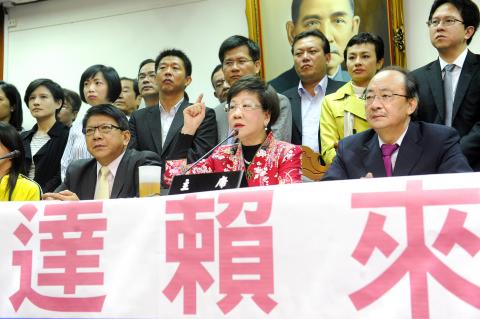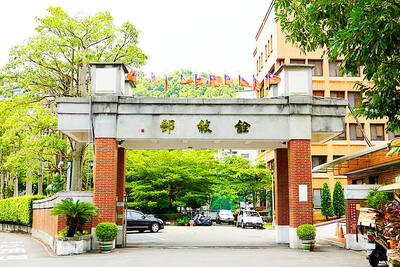Former vice president Annette Lu (呂秀蓮) and the Democratic Progressive Party (DPP) yesterday lambasted President Ma Ying-jeou’s (馬英九) government for denying a visa to the Dalai Lama, saying this was another “proof” of Ma’s pro-China position.
“President Ma, what are you afraid of? What do you want to do? Your denial of the Dalai Lama’s visit has hurt Taiwanese and Taiwan’s international image,” Lu told a joint press conference with the DPP caucus in the legislature.
Lu, head of the Asia-Pacific regional conference of the International Federation of Business and Professional Women (BPW International), which will be held in Taipei from Dec. 1 to 3, invited the Tibetan spiritual leader to attend the conference in February.

Photo: George Tsorng, Taipei Times
The former vice president said she personally asked Ma for help with the Dalai Lama’s visa on Sept. 1, and Ma told her the visit would be “a complex issue.”
BPW International president Freda Miriklis wrote Ma on Aug. 28 and Sept. 10 to inquire about the visit, according to Lu, but did not receive a response until Nov. 16, when Minister of Foreign Affairs David Lin (林永樂) turned down the visa request in a letter to Miriklis.
“As for His Holiness the Dalai Lama attending the Conference, he is welcome to travel to Taiwan in due course; however, we need to arrange a more opportune time for his visit,” Lin wrote in his reply.
Lu said the reply was “ridiculous” and that Ma had been evading the issue for four months since her first inquiry.
“People said Ma has been trying to remove all the roadblocks for Beijing so China would easily unify Taiwan in the future. Judging from what Ma has been doing, it would be difficult not to agree with the observation,” Lu said.
Human rights know no border or time, and every country that values democracy and freedom welcomes the Dalai Lama’s visit, DPP Chairman Su Tseng-chang (蘇貞昌) said in Hualien.
Using “inappropriate timing” as an excuse to deny the visit “does not make sense,” Su said.
“The denial “was a violation of the mainstream value of an international democratic society and has jeopardized Taiwan’s international image,” Liu Shih-chung (劉世忠), director of the DPP’s Department of International Affairs, said in a press release.
The Dalai Lama visited Taiwan three times in 1997, 2001 and 2009.
In 2001, then-Taipei mayor Ma said the city “always welcomes the Dalai Lama’s visit.”
However, Ma’s attitude toward the Tibetan leader’s visit came into question after he became president in 2008, as his administration had barred the Dalai Lama from visiting Taiwan several times.
Ma told the Taiwan Foreign Correspondents’ Club in December 2008 that while Taiwan generally welcomes religious leaders from all over the world, “I think at the current moment, the timing isn’t appropriate.”
The Dalai Lama was able to visit southern Taiwan at the invitation of seven DPP mayors and commissioners one month after Typhoon Morakot devastated parts of the south in August 2009, killing about 700 people and causing widespread damage.
A Presidential Office official said that the government’s decision to turn down the proposed visit was based on a “professional assessment” by relevant authorities.
The official, who declined to be named, did not elaborate on the government’s assessment, but said that Taiwan supports religious freedom and welcomes religious leaders from around the world to visit Taiwan for faith-related activities.
Additional reporting by CNA

Taiwan Semiconductor Manufacturing Co (TSMC, 台積電) is expected to start construction of its 1.4-nanometer chip manufacturing facilities at the Central Taiwan Science Park (CTSP, 中部科學園區) as early as October, the Chinese-language Liberty Times (the Taipei Times’ sister newspaper) reported yesterday, citing the park administration. TSMC acquired land for the second phase of the park’s expansion in Taichung in June. Large cement, construction and facility engineering companies in central Taiwan have reportedly been receiving bids for TSMC-related projects, the report said. Supply-chain firms estimated that the business opportunities for engineering, equipment and materials supply, and back-end packaging and testing could reach as high as

CHAMPIONS: President Lai congratulated the players’ outstanding performance, cheering them for marking a new milestone in the nation’s baseball history Taiwan on Sunday won their first Little League Baseball World Series (LLBWS) title in 29 years, as Taipei’s Dong Yuan Elementary School defeated a team from Las Vegas 7-0 in the championship game in South Williamsport, Pennsylvania. It was Taiwan’s first championship in the annual tournament since 1996, ending a nearly three-decade drought. “It has been a very long time ... and we finally made it,” Taiwan manager Lai Min-nan (賴敏男) said after the game. Lai said he last managed a Dong Yuan team in at the South Williamsport in 2015, when they were eliminated after four games. “There is

Democratic nations should refrain from attending China’s upcoming large-scale military parade, which Beijing could use to sow discord among democracies, Mainland Affairs Council Deputy Minister Shen You-chung (沈有忠) said. China is scheduled to stage the parade on Wednesday next week to mark the 80th anniversary of Japan’s surrender in World War II. The event is expected to mobilize tens of thousands of participants and prominently showcase China’s military hardware. Speaking at a symposium in Taichung on Thursday, Shen said that Chinese Minister of Foreign Affairs Wang Yi (王毅) recently met with Indian Prime Minister Narendra Modi during a visit to New Delhi.

FINANCES: The KMT plan to halt pension cuts could bankrupt the pension fund years earlier, undermining intergenerational fairness, a Ministry of Civil Service report said The Chinese Nationalist Party (KMT) caucus’ proposal to amend the law to halt pension cuts for civil servants, teachers and military personnel could accelerate the depletion of the Public Service Pension Fund by four to five years, a Ministry of Civil Service report said. Legislative Speaker Han Kuo-yu (韓國瑜) on Aug. 14 said that the Act Governing Civil Servants’ Retirement, Discharge and Pensions (公務人員退休資遣撫卹法) should be amended, adding that changes could begin as soon as after Saturday’s recall and referendum. In a written report to the Legislative Yuan, the ministry said that the fund already faces a severe imbalance between revenue